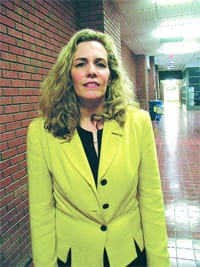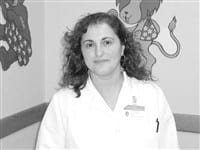An Intriguing Case A Practicing Attorney is Now Adding RN to her Business Card
Lynn Galletly needed a backup plan.
A practicing attorney and a Bar Advocate — one of hundreds of private attorneys statewide who accept clients who are indigent, and who otherwise would not be able to afford the services of an attorney — she had become increasingly frustrated with the stagnant rate of pay for such individuals ($30 per hour) and became worried that it might actually go down.
So she started to consider other career options and ways to supplement her law income, and eventually chose nursing — specifically, the associate’s degree program at Springfield Technical Community College.
Actually, there were several reasons why she chose to pursue nursing, including an interest in science and medicine, as well as a compassionate nature that comes across loud and clear as she talks about her legal clients and her work to help them. But Galletly was brutally honest when she said that money was the primary motivation for exploring the nursing field.
She had read and heard about a regional and national nursing shortage, and figured this was a field that offered job opportunities and a strong measure of security.
And nursing may well become a large part of Galletly’s professional future. For now, it will just be part, because the Commonwealth recently awarded Bar Advocates a raise — to $50 per hour — and she still very much enjoys her legal work, both in court and outside it. She is mulling pursuit of part-time legal work, perhaps a few 12-hour shifts per week, and looking at some ways to blend her legal and medical expertise.
Forensic nursing, an emerging specialty that involves care to victims of crime, collecting evidence, and providing health care services within the prison system, is one possibility, said Galletly, adding that another is a career as a so-called RN/JD, one who uses both professional degrees to forge careers in the expanding specialty of health care law.
“I’m looking at many different possibilities,” said Galletly, adding that she believes her composite mix of education and experience in both law and health care could open some exciting doors down the road, and she intends to take full advantage of those opportunities.
As The Health Care News introduces the region’s nursing class of 2006 (see page 20), it takes an indepth look at one of its more intriguing members.
Opening Arguments
Galletly talked with The Healthcare News after an eight-hour review session for the NCLEX, or National Council Licensure Examination a standardized exam that each state board of nursing uses to determine whether or not a candidate is prepared for entry-level nursing practice.
It’s a grueling test, perhaps six or eight hours of multiple-choice questions, said Galletly, who has some experience with such pressure-packed tests — specifically, the Mass. Bar Exam, which she took in 1988 and passed on her first try.
A psychology major who went first to UMass and then AIC, Galletly said she opted for law school upon graduation out of dual affinities for debating — “growing up, it seemed like I was always arguing with my sister and mother, and winning most of those arguments — and writing.
“You do a lot of writing in the course of conducting legal work,” she explained, “and I enjoyed that aspect of it.”
After graduating from the law program at Washington & Lee University in Virginia and passing the Mass. Bar exam, she started her career in the Hampden County District Attorney’s Office, serving as an assistant to D.A. Matthew Ryan, who by then was winding down a lengthy tenure in that post. When William Bennett was elected D.A. in 1990, Galletly changed gears and went into private practice.
Eventually, she became a bar advocate for Hampden County. In that role, she is appointed to cases by the clerk of courts, and, over the years, has represented hundreds of individuals, often with different legal concerns, but also the same common denominator: the inability to pay for legal representation.
The work — representing individuals charged with crimes ranging from drug distribution to larceny; sexual assault to breaking and entery — brings equal doses of challenges and rewards, said Galletly, noting that the individuals she represents are often overlooked or misunderstood by society in general.
“I have a good deal of compassion for these people,” she said. “Many of them are drug users, and most of them as kids had a horrendous upbringing, so my attitude is that somewhere along the line they didn’t get a fair shake.
“I don’t judge any of those people,” she continued. “I see these people when they’ve been in the lock-up all night, when they’re no longer high; that’s when you see the good qualities some out.”
While she’s always enjoyed the work of a bar advocate, Galletly she’s never enjoyed the compensation rates.
“We went 20 years without a raise,” she explained, adding that while many were arguing for increases in the rate, there was some discussion about actually lowering it $25 per hour. This prompted a number of bar advocates to “start looking around,” as she put it, noting that she was part of that group.
And where she looked was nursing, she told The Healthcare News, noting that there were several motivating factors. She was always a solid science student, she noted, and considered herself a caring, compassionate individual, which is considered a pre-requisite for the field.
But another part of the equation — one that should appeal to those who are trying to promote nursing as a viable career option for those already in the workforce — was the stories (anecdotal and on the front pages of newspapers and magazines) about the nursing shortage and the opportunities it presented.
“I needed a back-up plan,” she said. “I wanted to be able to supplement my income, and nursing looked like a very attractive alternative.”
Thus, she entered STCC’s extended-day program — with classes and programs in the afternoon and early evening — and commenced a difficult balancing act, juggling a rugged nursing curriculum with her bar advocate work and the raising of four children.
“There is a lot of flexibility in bar advocate work, which is good because I needed it,” she said, adding that she was able to block out court appearances on days with scheduled exams and programs. “It was tricky at times, but I managed; the kids are looking forward to me making dinner again.”
Looking forward, Galletly said that, short term, she is looking to take the NCLEX later this summer. Unlike most member of the nursing Class of ’06, she does not yet have a job in that field, primarily because she hasn’t applied for any.
A slot with two 12-hour shifts or something similar that would enable her to maintain her current legal schedule is the current preference. After gaining some experience in nursing, Galletly said she may explore some other options, including the emerging field of forensic nursing.
Described by some as the ‘intersection’ of nursing and the law, the specialty could include working with the victims of domestic and sexual violence or elder and child abuse, said Galletly, adding that, in many instances, this specialty combines the providing of care with evidence-gathering for possible legal action.
“It’s like crime scene investigations, which is something I think I’d be good at,” she said, adding that work in health care law might also be appealing, although she’d prefer to veer away from medical malpractice work.
Closing Thoughts
When asked to compare the two professions for which she is currently (or soon to be) qualified, Galletly said they both involve critical thinking and the need to discern the best answer for the client/patient.
She then joked, “nursing is a lot like law — except there’s much more work to do.”
Getting more serious, she said she’s looking forward to doing both at the same time, and eventually blending both fields into something unique.
For now, her business card says simply ‘attorney at law,’ but that will likely change, with the letters RN added to the mix.
They should help spell some exciting and rewarding career options.




Comments are closed.